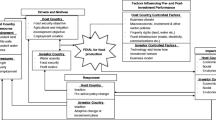Abstract
This paper provides an overview of Gulf investments in foreign farmland, mainly in developing countries, and the motivation behind these investments. The literature suggests that private entities in Gulf countries are engaging in these investments for portfolio diversification, while Gulf governments are investing to ensure food security challenges resulting from the limited agricultural resources of these countries. The paper also discusses examples of farmland investments in Sudan, Indonesia and Pakistan, and their consequences. The main recommendation is the need to ensure that these investments provide positive externalities to the host countries and local communities involved, in order to ensure the continuity and acceptability of these investments.

Similar content being viewed by others
Notes
GCC countries include Bahrain, Kuwait, Oman, Qatar, Saudi Arabia, and the UAE.
One step would be to develop a voluntary ‘code of conduct’ to guide socially responsible investment. For details, see the paper “International investments in developing country agriculture: issues and challenges” by David Hallam, elsewhere in this issue.
References
Associated Press. (2008). Booming Gulf looks abroad for food needs. New York: Associated Press.
Bazza, F. (2005). Policies for water management and food security under water-scarcity conditions: the case of GCC countries. Proceedings of the 7th Gulf Water Conference, Kuwait, 19–23 November 2005. Rome, Italy: Food and Agricultural Organization of the United Nations.
Bos, M. (2008). Ensuring food security: For the GCC, the answer lies in a partnership with Africa. Research report. Dubai: Gulf Research Center.
GRAIN (Genetic Resources Action International). (2008). Seized! The 2008 land grab for food and financial security. Information Brief. Barcelona: GRAIN.
GRC. (2007) GCC states profiles. Dubai, United Arab Emirates: Gulf Research Center. http://www.grc.ae/index.php?sec=Search+GRC&PHPSESSID=e69a5131abfceb3d111bd2347c3056e5. Accessed 15 August 2009.
GRC. (2008) GCC Market Review—May 18, 2008. Dubai, United Arab Emirates: Gulf Research Center. http://www.grc.ae/ Accessed 15 August 2009.
Greenstein, I. (2008). Oil-rich Persian Gulf states are making a headlong rush for farmland. News, 8 January 2008. http://www.agrilandsales.com/news-38.html. Accessed 31 March 2009.
Kaikati, J. G. (2009). The economy of Sudan: a potential breadbasket of the Arab world? International Journal of Middle East Studies, 11, 99–123.
Mackenzie, D. (2008). Rich countries carry out 21st century land grab. New Scientist, 2685, 11–12.
Morris, M., Drake, L., Ezemenari, K., & Diao, X. (2007). Promoting sustainable pro-poor growth in Rwandan agriculture: What are the policy options? Proceedings of the American Agricultural Economics Association Annual Meeting, Portland, Oregon, July 29-August 1, 2007. http://ageconsearch.umn.edu/bitstream/9908/1/sp07mo03.pdf. Accessed 31 March 2009.
Niblock, T. (1985). Sudan’s economic nightmare. MERIP Report 135:15–18. Washington, DC, USA: Middle East Research and Information Project.
Ryall, J., & Pflanz, M. (2009). Land rental deal collapses after backlash against ‘colonialism’. London: The Telegraph.
Shepard, D., & Mittal, A. (2009). The great land grab: Rush for world’s farmland threatens food security for the poor. Oakland: The Oakland Institute.
The Guardian. (2008). The world land grab map. London: The Guardian.
The Independent. (2009). Wish you weren’t here: The devastating effects of the new colonialists. London: The Independent.
World Development Report. (2008). Agriculture for development – Part III: How can agriculture-for-development agendas best be implemented? Washington: The World Bank.
Author information
Authors and Affiliations
Corresponding author
Rights and permissions
About this article
Cite this article
Zurayk, R., Chaaban, J. & Sabra, A. Ensuring that potential Gulf farmland investments in developing countries are pro-poor and sustainable. Food Sec. 3 (Suppl 1), 129–137 (2011). https://doi.org/10.1007/s12571-010-0107-y
Received:
Accepted:
Published:
Issue Date:
DOI: https://doi.org/10.1007/s12571-010-0107-y




